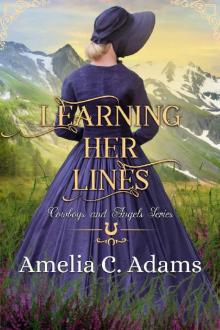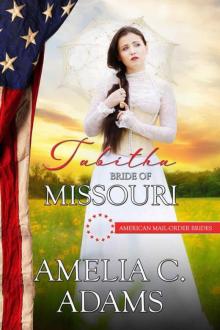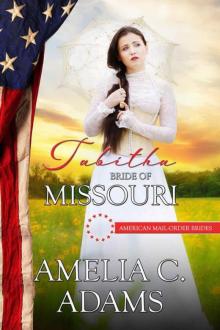- Home
- Amelia C. Adams
Herd to Breathe
Herd to Breathe Read online
Herd to Breathe
The Bride Herder Book Three
by Amelia C. Adams
With thanks to my beta readers—Amy, Barbara, Bonnie, Cindy, Dorothy, Joseph, Lisa, Renee G., Renee L., Robin, Sandy, Suzy, and Theresa.
Cover design by Virginia McKevitt
Would you like to join the Facebook readers group for the Bride Herder series? Click here!
Don’t miss the previous books in the series:
A Bride to Herd
Herd the Music
Table of Contents:
Chapter One
Chapter Two
Chapter Three
Chapter Four
Chapter Five
Chapter Six
Chapter Seven
Chapter Eight
Chapter Nine
Chapter Ten
Epilogue
Chapter One
Cina Fairbanks smiled when she looked up from her desk and saw Mrs. Peterson and Mr. Green enter her schoolroom. She’d stayed late that afternoon to grade some papers and had enjoyed the quiet, but a distraction was welcome after an hour or so of her own thoughts.
“Mrs. Peterson, Mr. Green, it’s good to see you. What can I do for you today?”
She started to rise, but Mr. Green waved her back into her chair. “Miss Fairbanks, we’re here on a matter of school board business.”
“Yes? Is something wrong?”
Mrs. Peterson pressed her lips together. “It’s our unfortunate duty to inform you that several comments have come our way concerning you.”
Cina’s heart constricted in her chest. She wasn’t aware of anything that had happened to bring attention to herself.
“What kinds of comments, Mrs. Peterson?”
“Complaints, actually,” Mr. Green interjected.
Cina didn’t understand. Everything had been going so well with her class. She’d had very few discipline problems, and those had been solved by spending a little extra time with the students involved and discovering the reasons for their outbursts. She truly loved every child in her school, and the thought that she was receiving complaints . . . It shocked her.
“You see, Miss Fairbanks, some of the mothers feel that you’re distracting their sons from doing their work,” Mr. Green went on.
“I’m distracting them?”
“Yes, and they feel this school would be better off with a male teacher.”
Cina lifted a hand. “Mr. Green, please slow down a little. Just how am I distracting these boys? Am I whistling during spelling tests or something like that?”
Mr. Green glanced over at Mrs. Peterson as though asking for help. She took over. “It’s your general physical appearance, Miss Fairbanks. The boys are spending more time looking at you than they are listening to their lessons.”
Of all the . . . Cina glanced down at the dark brown skirt and plain white blouse she wore. Her hair was tied back in a ribbon, and she’d done nothing with powders or rouge. She was dressed as simply as she could possibly be. “And yet they’re still getting good marks on their exams,” she replied. “What are the mothers basing their findings on?”
“The fact that when the boys are asked what they learned in school that day, they can’t stop talking about how pretty you are, and they’re not relaying anything about their actual studies.” Mrs. Peterson rocked back on her heels. “This is why we think a male teacher would be the best solution.”
“I . . . I don’t know what to say.” Cina looked toward the window for a moment, trying to focus her thoughts. “I’ve never done anything to encourage their admiration—I’m sure you can see how plainly I dress. I’ve done my best to be an interesting and competent teacher, and I would hope that their test scores would be a better indication of my performance than what they choose to share with their parents at night.”
“Some women are blessed with more natural beauty than others,” Mrs. Peterson said, giving a little sniff. “We can’t fault you for being pretty, but if it’s causing disruption in the classroom, something must be done.”
“I don’t believe that it is causing a disruption! All my students are well-behaved and attentive, and nothing of a disruptive nature is taking place here. You’re basing your conclusions on the reports of a few parents instead of investigating it for yourselves. Why don’t you visit during school hours sometime next week and see for yourself?”
“Because these parents are asking for action immediately,” Mr. Green said. “It’s Friday afternoon, and by Monday morning, we can have a new teacher installed. It will be a very smooth transition, Miss Fairbanks—your students won’t be disturbed at all.”
Cina placed her palms flat on the table and came to her feet. “You’re firing me because I’m pretty—something over which I have no control? And you already have another teacher ready to take over? I know exactly what’s going on here, Mr. Green. The new teacher is Harvey Johnson, and Mrs. Johnson has been leading this charge so her precious nephew can take this post. This really has nothing to do with my appearance at all—that’s merely the excuse you’re using.”
Mrs. Peterson and Mr. Green glanced at each other, but didn’t comment.
“I’m in education, not politics. Yes, those two things are more closely knit than any of us would like to admit, but I refuse to let these shenanigans rob me of a post I love. I’ll be speaking to every city councilman and every person of influence in this town over the course of the weekend, and you can plan on this being overturned. Now, if you please, I have some papers to finish grading for my class.”
The two members of the school board turned and left. Cina watched them go, then sank back into her chair, her hands shaking with a combination of fury and shock. What a ridiculous . . . How preposterous … Saying she was too pretty to be a teacher, so they had to fire her . . . She’d never cared much for Mrs. Mabel Johnson, but now she loathed the woman and her conniving, grasping ways.
Cina managed to finish grading the papers, then she locked up the schoolhouse and began her walk home. As she went, she noticed several people huddling in small groups chattering about something, nodding her way, but growing still as she approached them. It was quite exasperating.
In need of some dinner, but not wanting to cook for herself, she stepped into the small restaurant nearest her lodgings and was met by Dora, her favorite waitress. The girl took her by the arm and ushered her over to the corner.
“I don’t think you’d better come in here, Miss Fairbanks,” Dora said in a whisper. “There’s trouble.”
“What are you talking about?” Cina craned her neck to see into the dining room. She couldn’t detect fist fights or anything breaking out.
“The gossip. Oh, Miss Fairbanks, I know it’s not true, but so many people are saying it—it’s like they’re planning to lynch you at midnight or something!”
Cina rubbed her forehead. “Just what are they saying, Dora?”
“Are . . . are you sure you want to know?”
“Of course I do. How am I to tell them the truth if I don’t know the lie?”
Dora bit her lip. “They’re saying that you’ve been spending a little extra time with Daniel Hopkins.”
“What?” Daniel Hopkins was the widowed father of Jacob Hopkins, one of her students. “I barely know him.”
“Well, they’re saying you know him quite well. That you’ve been seen . . . late at night . . . letting him out of your rooms.”
Cina blinked several times. “Surely you’re teasing me.”
Dora looked pained. “Oh, I wish! But no—they’re all saying it, and they’re adding on to the story. Now they’re saying that you’re expecting his child.” Her voice dropped so low, Cina almost couldn’t understand it.
“Who started this rumor?”
she asked, even though she had a good idea.
“The first I heard of it was from Edith Munster.”
Mabel Johnson’s best friend. Of course. “And where is Daniel Hopkins? One word from him could clear up this whole thing.” Then she remembered. “He’s out of town on business, and he took Jacob with him.” The boy had been excused from school for the trip, and they wouldn’t be back for a week.
Cina shook her head. Such magnificent timing. “So they’re spreading vicious lies, and the two who could speak up for me aren’t even in town right now. You know what this is, Dora—it’s Mabel Johnson angling to get her nephew a job, one he couldn’t get on his own because he’s a terrible teacher.”
“I do know it, but sadly, people in this town are scared of Mabel Johnson, and they’ll do whatever she says.”
“I’m not scared of Mabel Johnson,” Cina said. “Not in the slightest, and I don’t intend to give up my job to a sniveling rabbit of a man who doesn’t even know the difference between Antarctica and Australia.” She turned on her heel and left, no longer hungry. Fury ran through her veins like a river. How could those people participate in this obvious attempt to ruin her reputation and consequently, her career as a teacher? Hadn’t she lived here for years—didn’t they know her? Yes, they did, but they knew Mabel better.
She entered her apartment, locked the door behind her, and flung herself on her bed. She needed a plan, some way to interrupt the rumor mill. Mabel Johnson was the wife of the former mayor, and as such, she carried a lot of influence. Cina was no one—her parents had died of a sudden illness earlier that year, and she’d chosen to stay because of her teaching position. She had no politicians on her side, no good friend on the city council. How could she expect her word to win out against the likes of Mabel Johnson?
After several long minutes, she sat up and took off her shoes. Then she went into the kitchen and cut herself a slice of bread. She wished she’d been able to retain the home she’d grown up in, but the bank had taken it against back debt, and now she lived in this small apartment provided by the school board as part of her salary. No doubt Harvey Johnson would enjoy living there very much.
All she could do was speak the truth and hope someone would believe her. And if they didn’t . . . well, it was all very well and good to say that at least God knew the truth, but she wasn’t aware if God was hiring teachers at the moment or if He had a backup plan for her.
Cina spent all of the next day trying to speak with anyone who would have some influence over the school board, but no one would meet with her. Those who bothered to acknowledge her explained that it was Saturday and they couldn’t possibly discuss business until Monday, but many of them wouldn’t even look in her direction. A few mothers expressed their sympathy that this was happening, but that was followed by their general feelings that there was nothing they could do because after all, this was Mabel Johnson they were going up against, and no one could possibly prevail over Mabel Johnson.
Cina went to bed completely heartsick Saturday night. The only saving grace in her entire day had been when Dora flagged her down on the sidewalk and gave her a packaged lunch. At least someone cared, but Dora’s belief in her wasn’t enough to stamp out the wildfires of suspicion.
Sunday . . . well, Cina decided to wipe Sunday from her memory entirely. She was greeted on the church steps by the pastor’s wife, who took her by the arm and told her that it was probably best if she didn’t attend because there were those in the congregation who didn’t feel that it was right for a woman of her sort to enter God’s house.
In two short days, her entire life had been ruined, and she hadn’t done one thing to deserve it.
Leaving the churchyard, she walked to a small park down the road and sat on a bench. At least it wasn’t too cold outside despite being late winter. She had meant for Marianna, Florida, to be her home until she died, but this was ridiculous, and she had no intention of sticking around to see what happened next. She was giving Mrs. Johnson exactly what she wanted, but she wasn’t leaving with her head drooping in shame. That simply wasn’t something she could do.
She went back to her rooms and pulled out a pen and paper, then wrote a short note defending her position and asserting her innocence. Then she packed up all her bags and trunks, leaving her apartment as bare as one of the trees outside. It took a few more coins than she really felt she could spare, but she was able to hire a young man to help get her things to the railway station, and she gave him an extra coin to deliver her letter to the town newspaper. She was paying for an ad, and she truly hoped it would be printed. It was all she could think to do, since no one would listen to her.
Her aunt lived in Montgomery, Alabama, a much larger town nearly one hundred and fifty miles to the north. The train ride was long and tedious, especially because Cina was already worn out from everything that had happened, and when she finally stepped foot off the train and collected her luggage, she thought she would collapse right there from exhaustion. But Zina Fairbanks had received her telegram and met her on the platform, wrapping her up in a warm hug and lending her strength before she could crumple up and sob.
“There now,” Aunt Zina said into her hair as she embraced her. “You’ve had a rough time of it, dolly, and we’re going to make things right. Come home with me and have something hot to eat, and we’ll talk it over.”
Nothing in the world had ever sounded so wonderful.
Zina’s household staff took care of everything—transporting Cina’s luggage, preparing her a room, serving her a delicious meal. Zina oversaw everything, and Cina felt the weight of her oppression lifting from her chest as she explained the finer details impossible to include in a telegram.
“Oh, my dear, I’m so sorry.” Zina placed her teacup back in its saucer and studied her niece. “How unfair, and how very cruel. I dream of a world where there are protections in place against such unfair hiring practices, but I fear that won’t happen in my lifetime.”
“Don’t talk like that,” Cina protested. “You make it sound as though you’re planning to die very soon.”
“Well, not soon, but you do realize I’m not young anymore.” Zina regarded Cina with wise eyes. “You and I are so much the same person—I believe that’s why your father named you after me, so to speak. He couldn’t have known back then of your fire and determination, but it certainly has blossomed in you. I wish you’d come to live with me when your parents passed. You would have been spared so much.”
“Yes, I would have been, and believe me, I’ve had the same thought more than once. I wanted to try life on my own, though—I wanted to be independent.”
“Yes, that stubborn streak that afflicts the women in this family. How well I recognize it.” She shook her head. “Will you live with me now and allow me to share my remaining days with you?”
Cina paused. Her aunt’s home was lovely, to be sure, and she knew she’d be comfortable here. But . . . “Do you think I’d be able to find a teaching position nearby? I already miss my classroom, even though it’s only been a few days.”
“We can certainly look around, my dear. I know you wouldn’t be happy unless you felt you were engaged in doing something useful.”
“That’s right—I like keeping my hands and my mind busy.”
Aunt Zina nodded. “I have some friends who would be more than happy to lend us their wisdom. I’ll invite them over for tea tomorrow and we’ll see what they have to say.”
Chapter Two
“You’re lovely. Just lovely.” Mrs. Gardner looked at Cina’s face from every angle, almost making Cina uncomfortable with her scrutiny. “Oh, I can see your father in your eyes, my dear. The Fairbanks eyes are rather famous, you know.”
“I never could understand why your parents chose to move down to Florida,” Mrs. Henderson said. “I enjoyed catching a glimpse of your father’s handsome features at church each week, and when he was no longer there, church became rather dull.”
Cina couldn’t hide her smil
e. “Yes, my father was a very handsome man.”
“Come sit down and have some tea,” Aunt Zina directed, pouring out cups for her guests. “We have a rather pressing problem on our hands—what to do with our Cina.”
“Marriage,” Mrs. Henderson said promptly. “Marriage is the only thing that will save her now.”
“But I don’t know anyone,” Cina protested. “At least, anyone eligible.”
“We can take care of that, my dear,” Mrs. Henderson said. “Leave it to us and we’ll have you married before spring.”
“I would still like to teach. Is that a possibility?”
“I don’t think so,” Mrs. Gardner replied. “It’s common practice here, as I’m sure it was in Florida, for schoolteachers to be unmarried. Besides that, most men wouldn’t like their wives having an occupation outside the home.”
“Then I’ll be a maiden schoolteacher,” Cina replied. She didn’t want to argue with a husband about her desire to teach, and if he was the sort to argue with her, he wasn’t the sort she wanted to marry. It seemed easiest just to skip over that problem altogether and head for the easy solution of not getting married after all.
“I’ll send around some inquiries, and we’ll see if we can find you a position,” Mrs. Gardner replied. “I’m well known to several schools in the area, as well as to the school board.”
“Thank you so much, Mrs. Gardner. Your help is so appreciated.”
The ladies had a wonderful tea, and Cina enjoyed watching the women laugh together. They almost seemed like young women again, perhaps not even married yet, as they shared gossip and compared the handsome men in town—“But still none as handsome as your father, Cina,” they assured her.
When they came calling again the next day, however, their spirits weren’t nearly as high.
“We got right to work the minute we left here yesterday,” Mrs. Gardner said, perching on the edge of her chair as though she was too flustered to allow herself to relax.

 Honoring Her Heart
Honoring Her Heart Buttons and Bows
Buttons and Bows An Agent for Emily
An Agent for Emily Christmas Catch-Up VIII (River's End Ranch)
Christmas Catch-Up VIII (River's End Ranch) A Rancher for Rowena
A Rancher for Rowena Candice (Seven Sisters Book 6)
Candice (Seven Sisters Book 6) Butterfly Kisses
Butterfly Kisses A Stitch in Time
A Stitch in Time Buttons and Bows (The Sewing Circle Book 3)
Buttons and Bows (The Sewing Circle Book 3) Sidearms and Songbirds (Hearts of Nashville Book 3)
Sidearms and Songbirds (Hearts of Nashville Book 3) Herd to Breathe
Herd to Breathe The Ties That Bind
The Ties That Bind Rhyme or Reason
Rhyme or Reason Revelations (Brody Hotel Book 4)
Revelations (Brody Hotel Book 4) Phoebe's Fate (Burnt River Contemporary Western Romance Book 9)
Phoebe's Fate (Burnt River Contemporary Western Romance Book 9) And Something Blue (Main Street Merchants Book 1)
And Something Blue (Main Street Merchants Book 1) Learning Her Lines
Learning Her Lines Connections
Connections The Turn of a Wheel (Kansas Crossroads Book 17)
The Turn of a Wheel (Kansas Crossroads Book 17) Just Desserts (Main Street Merchants Book 4)
Just Desserts (Main Street Merchants Book 4) An Agent for Anna
An Agent for Anna An Agent for Esme
An Agent for Esme A Handyman for Helen
A Handyman for Helen Scented Sensibility
Scented Sensibility Addie's Adventurer
Addie's Adventurer Defying the Darkness
Defying the Darkness Riding the Rails
Riding the Rails Sugar And Spice (Main Street Merchants Book 7)
Sugar And Spice (Main Street Merchants Book 7) An Agent for Cynthia
An Agent for Cynthia In The Stars (Main Street Merchants Book 6)
In The Stars (Main Street Merchants Book 6) Moonlight With Alice (The Matchmaker's Ball Book 3)
Moonlight With Alice (The Matchmaker's Ball Book 3) Five Golden Rings (Main Street Merchants Book 3)
Five Golden Rings (Main Street Merchants Book 3) Between The Lines (Main Street Merchants Book 5)
Between The Lines (Main Street Merchants Book 5) An Agent for Lucy
An Agent for Lucy Jessica (Seven Sisters Book 2)
Jessica (Seven Sisters Book 2) A Passing Glance
A Passing Glance Pet Peeves
Pet Peeves RNWMP: Bride for Joel
RNWMP: Bride for Joel Bowing to Betsy (The Matchmaker's Ball Book 11)
Bowing to Betsy (The Matchmaker's Ball Book 11) Rebekah (Seven Sisters Book 4)
Rebekah (Seven Sisters Book 4) A Joyful Noise (Kansas Crossroads Book 14)
A Joyful Noise (Kansas Crossroads Book 14) Her Second Chance Hometown Groom
Her Second Chance Hometown Groom A Christmas Promise (Kansas Crossroads Book 16)
A Christmas Promise (Kansas Crossroads Book 16) Bride for Samuel
Bride for Samuel Bribing the Blacksmith (Cowboys and Angels Book 9)
Bribing the Blacksmith (Cowboys and Angels Book 9) RNWMP: Bride for Samuel (Mail Order Mounties Book 12)
RNWMP: Bride for Samuel (Mail Order Mounties Book 12) Tea for Two
Tea for Two The Bitter and the Sweet (Kansas Crossroads Book 9)
The Bitter and the Sweet (Kansas Crossroads Book 9) Frank (Seven Sons Book 6)
Frank (Seven Sons Book 6) A Cattleman for Cora
A Cattleman for Cora Paislee's Path (River's End Ranch Book 48)
Paislee's Path (River's End Ranch Book 48) Accidental Agent (River's End Ranch Book 3)
Accidental Agent (River's End Ranch Book 3) Test of Time (Nurses of New York Book 5)
Test of Time (Nurses of New York Book 5) RNWMP: Bride for Michael (Mail Order Mounties Book 24)
RNWMP: Bride for Michael (Mail Order Mounties Book 24) Loving the Landlord
Loving the Landlord The Dark and the Dawn (Kansas Crossroads Book 3)
The Dark and the Dawn (Kansas Crossroads Book 3) Candy Crush
Candy Crush Tabitha: Bride of Missouri (American Mail-Order Bride 24)
Tabitha: Bride of Missouri (American Mail-Order Bride 24) Touch of Tenderness (Nurses of New York Book 3)
Touch of Tenderness (Nurses of New York Book 3) Lucky Lifeguard (River's End Ranch Book 28)
Lucky Lifeguard (River's End Ranch Book 28) Heartstrings (Brody Hotel Book 2)
Heartstrings (Brody Hotel Book 2) Heart of Hearts (Nurses of New York Book 4)
Heart of Hearts (Nurses of New York Book 4) Hope_Bride of New Jersey
Hope_Bride of New Jersey A Careless Wind (Kansas Crossroads Book 7)
A Careless Wind (Kansas Crossroads Book 7) An Agent for Emily (The Pinkerton Matchmaker Book 28)
An Agent for Emily (The Pinkerton Matchmaker Book 28) A Twisted Fate
A Twisted Fate Delivering Destiny (River's End Ranch Book 23)
Delivering Destiny (River's End Ranch Book 23) Tabitha_Bride of Missouri
Tabitha_Bride of Missouri A Wrangler for Wynonna
A Wrangler for Wynonna RNWMP_Bride for Peter
RNWMP_Bride for Peter An Unspoken Dream (Kansas Crossroads Book 13)
An Unspoken Dream (Kansas Crossroads Book 13) Generations
Generations Utah Sunrise (Rocky Mountain Romances Book 1)
Utah Sunrise (Rocky Mountain Romances Book 1) Bride for Jonathan
Bride for Jonathan Bribing the Blacksmith
Bribing the Blacksmith A Clean Slate (Kansas Crossroads Book 4)
A Clean Slate (Kansas Crossroads Book 4) Hope: Bride of New Jersey (American Mail-Order Brides 3)
Hope: Bride of New Jersey (American Mail-Order Brides 3) Rugged Rockclimber (River's End Ranch Book 8)
Rugged Rockclimber (River's End Ranch Book 8) RNWMP_Bride for Michael
RNWMP_Bride for Michael RNWMP: Bride for Joel (Mail Order Mounties Book 4)
RNWMP: Bride for Joel (Mail Order Mounties Book 4) Tea For Two (Cowboys & Angels Book 15)
Tea For Two (Cowboys & Angels Book 15) Sweet Georgia Peach
Sweet Georgia Peach RNWMP: Bride for Peter (Mail Order Mounties Book 20)
RNWMP: Bride for Peter (Mail Order Mounties Book 20) A Clear Hope (Kansas Crossroads Book 5)
A Clear Hope (Kansas Crossroads Book 5) Meredith's Mistake (Grandma's Wedding Quilts Book 4)
Meredith's Mistake (Grandma's Wedding Quilts Book 4) RNWMP_Bride for Samuel
RNWMP_Bride for Samuel The Whisper of Morning (Kansas Crossroads Book 6)
The Whisper of Morning (Kansas Crossroads Book 6) RNWMP: Bride for Jonathan (Mail Order Mounties Book 8)
RNWMP: Bride for Jonathan (Mail Order Mounties Book 8) Santa's Shopkeeper (River's End Ranch Book 18)
Santa's Shopkeeper (River's End Ranch Book 18) A Broken Wing (Kansas Crossroads)
A Broken Wing (Kansas Crossroads) Cause of Conflict (Nurses of New York Book 2)
Cause of Conflict (Nurses of New York Book 2) A Free Heart
A Free Heart A New Beginning
A New Beginning The Calm of Night (Kansas Crossroads Book 10)
The Calm of Night (Kansas Crossroads Book 10) Bride for Calvin
Bride for Calvin Sea of Strangers (Nurses of New York Book 1)
Sea of Strangers (Nurses of New York Book 1)